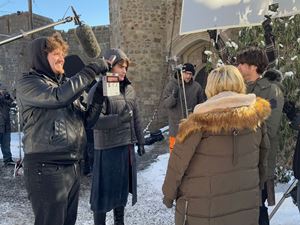Our program emphasizes the artistic vision and the practical business acumen needed to navigate the changing media landscape.
-
Program Overview
The TV/Film Production concentration begins with introductory classes that explore narrative and documentary storytelling through screenwriting, on-location and studio filming, and post-production editing and sound design. Students also create program content for non-profit clients, both on and off campus.
Students have the opportunity to pursue film and TV production through programs based in New York City, Los Angeles, and abroad. Internships provide professional experience culminating in a full-semester immersive internship and the creation of a capstone project. Taken together, a student can emerge with a portfolio of professional programming and the skills needed to flourish after graduation.
The Future of Journalism? It’s Right Here at the Nest
An experimental partnership between student journalists and local media is helping to serve an industry in distress—and Gulls are thriving.
-
Year 1Learn the fundamentals of storytelling and the basic technical skills to create visual presentations.
Every collegiate journey begins with the basics. First-year classes emphasize the fundamentals of TV/Film Production storytelling.
Students are introduced to pre-production planning, camera, sound, and lighting techniques, and post-production skills using the Adobe Suite.
Students complete their first internship experience in the summer following their first academic year.
Year 1- Introduction to Digital Filmmaking
- Introduction to Multimedia Narrative
- TV Studio Production
- Critical Reading & Writing I and II
- Media and Culture I
- Media Aesthetics
- General Education Requirements
- Electives
-
Year 2Continue to hone theoretical and practical skills in the classroom and in the field.
Students advance their skills through classes in the business of television and film, writing for the screen, hands-on experience with our advanced cameras and in-depth exploration of post-production editing techniques.
Students complete their second internship experience either in winter session the summer following the academic year.
Year 2- Advanced Digital Filmmaking I
- Screenwriting
- Post-Production Techniques
- Digital Media Law & Ethics
- The Contemporary TV Industry
- General Education Requirements
- Electives
-
Year 3Become a storyteller and consider the impact of your work.
Advanced production and research classes refine skills, so that students begin to plan, write and envision their Senior Capstone film. They take our Engaging Clients class where students work with a non-profit client on a marketing project. Clients have included the Dana Farber Cancer Institute, Hammond Castle Museum, Lifebridge, New Entry Sustainability Farming Project and Endicott’s Living Learning Community.
Students have the option to study abroad or in the US for a semester. Our partnerships allow for study in New York City or California and build connections with film and TV industry professionals.
Year 3- Advanced Digital Filmmaking II
- Research Methods for Digital Media Majors
- Social Impact of the Media
- Engaging Clients Through Digital Film
- Documentary modes
- General Education Requirements
- Electives
-
Year 4Create a documentary or narrative film thesis project while completing a full-semester experiential learning internship.
In their final year, students complete a full-semester internship. Students work with industry professionals, companies, and institutions for 20-30 hours each week. This immersive experience aids students with their transition after graduation.
At the same time, students research, write, plan, cast, film, and edit their Capstone film. Students enhance their portfolio with work that’s their best representation of all that they’ve learned. Student films have gone on to screen at film festivals.
Year 4- Senior Research
- Senior Capstone
- Contemporary Explorations in Communication
- Senior Internship
- Free Electives
-
Internships and Careers
An Endicott education means you'll graduate with a degree and a resume.
Whether you pursue graduate school or embark on your career right away after graduation, we believe that your time at Endicott will prepare you for the next step.
Recent Internships
- Gannett
- Northshore Magazine
- The American Prospect
- Gloucester Daily Times
- Harvard Athletics
- NH PBS
- The Daily Item
- WSVN-TV
- Massachusetts Women’s Political Caucus
- WICN.ORG
- Modern Luxury Media
Alumni Employment
- The Daily Item
- Western Mass News
- Barstool Sports
- Hearst Television
- NBC Universal
- Boston 25 News
- EF Education First
- The Rendon Group

Lights, Camera, Career
By combining real-world experience with industry connections and internships Endicott’s TV/Film Production concentration creates a path for students to transition into careers in TV and film.


